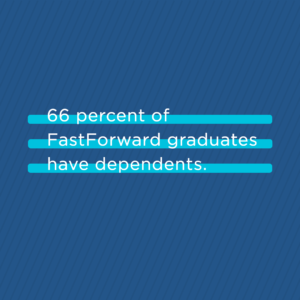
Compared to other programs out there, FastForward at your local community college has a relatively straightforward application and enrollment process. If you don’t believe us, here’s what one graduate had to say:
“The process to register was simple, even when I got the paperwork, I was like, ‘Is that it?’ I was expecting much more.” (Read more from Greg’s story here.)
But the application process isn’t the hold up for starting training. These are the three biggest hurdles for our students as they enroll and prepare to train through FastForward.
Payment
The average tuition for FastForward training is around $1,100, but a lot of our students can get training for far less.
“One of the biggest challenges students face when enrolling in a FastForward training course is paying any out-of-pocket expenses,” said Alejandra Diaz-Rangel, our coach at Tidewater Community College.
For example, if you’re pursuing a Skilled Trades or Welding job, you may need a pair of steel-toed boots to be compliant on the job site. There are resources available if out-of-pocket expenses are a hurdle for you. Speak with a career coach to learn more.
Travel
Another related out-of-pocket expense is traveling to training. For our more rural community college programs, some students may have to travel several miles to attend training.
“Travel cost is a big one,” said Lee Davis from Mountain Empire Community College. “Some travel an hour sometimes in our region to get to training. Fuel costs add up.”
Some colleges have relationships with regional transportation services, others have grants to provide gas cards to help offset costs. Once you apply, check in with your FastForward Career Coach to see what options are available where you are.

Scheduling work and childcare
In one of your first conversations with a FastForward Career Coach, talk about what you have going on in your life. It’s your coach’s job to help you work training into your schedule, and they can help you find the right training, at the right time to fit you needs. Some colleges and communities can even help with childcare (Danville Community College has a childcare facility on-site that accepts subsidies).
The third piece that can be a major challenge to our students is scheduling. While the community college offers flexible training options, like evening and weekend trainings, if you’re employed or have dependents, scheduling plays a big part in following through with your training.
To help break down these barriers, have an open conversation with your local Career Coach.